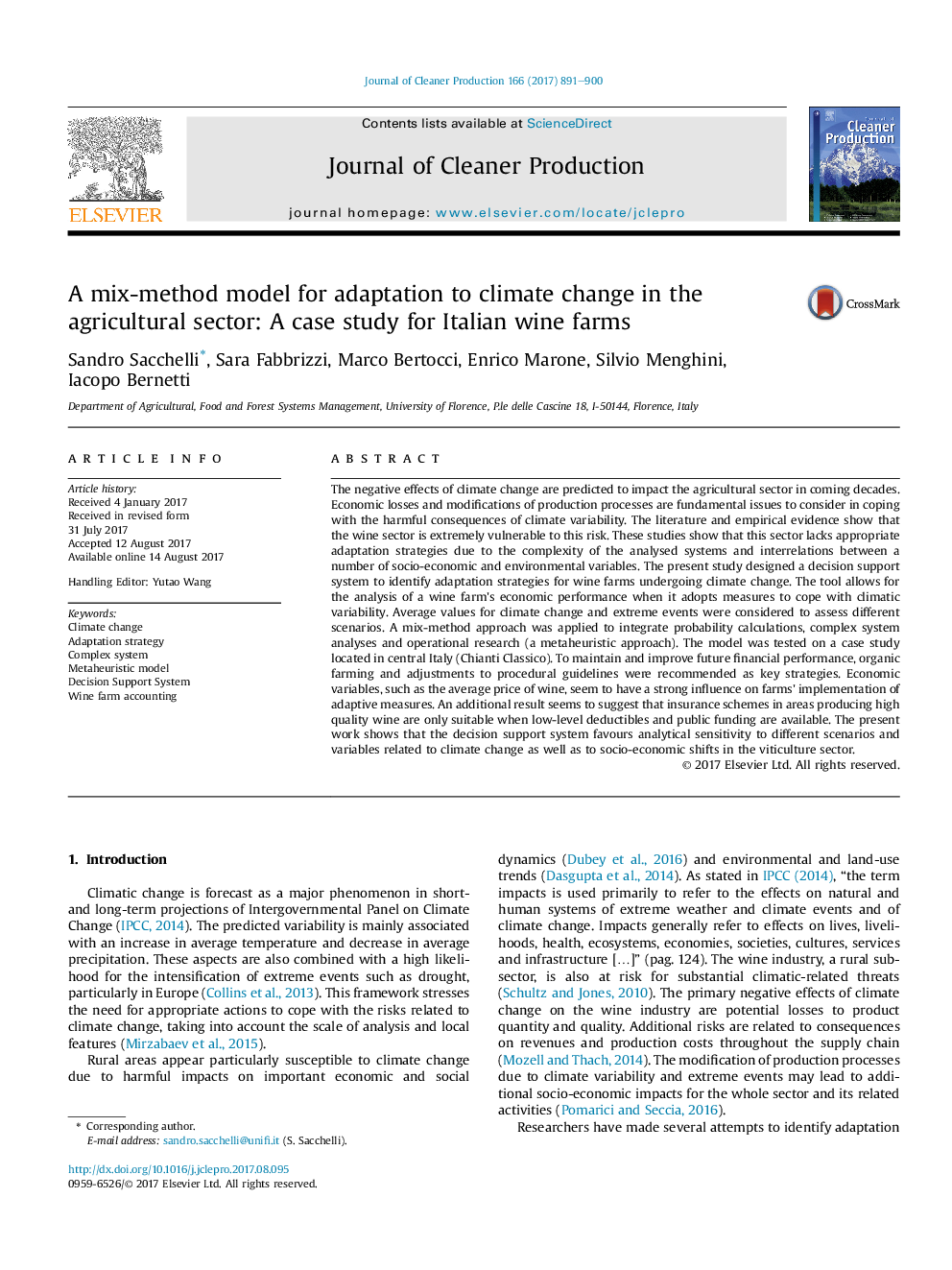ترجمه فارسی عنوان مقاله
مدل ترکیبی برای سازگاری با تغییرات آب و هوایی در بخش کشاورزی: مطالعه موردی برای مزارع شراب ایتالیایی
عنوان انگلیسی
A mix-method model for adaptation to climate change in the agricultural sector: A case study for Italian wine farms
| کد مقاله | سال انتشار | تعداد صفحات مقاله انگلیسی |
|---|---|---|
| 140525 | 2017 | 10 صفحه PDF |
منبع

Publisher : Elsevier - Science Direct (الزویر - ساینس دایرکت)
Journal : Journal of Cleaner Production, Volume 166, 10 November 2017, Pages 891-900
ترجمه کلمات کلیدی
تغییر آب و هوا، استراتژی انطباق، سیستم پیچیده مدل متهوریستی، سیستم پشتیبانی تصمیم گیری، حسابداری مزرعه شراب،
کلمات کلیدی انگلیسی
Climate change; Adaptation strategy; Complex system; Metaheuristic model; Decision Support System; Wine farm accounting;
ترجمه چکیده
اثرات منفی تغییرات آب و هوایی پیش بینی می شود که در دهه های آتی بر بخش کشاورزی تأثیر بگذارد. زیان های اقتصادی و تغییرات فرایندهای تولید، مسائل اساسی در مقابله با پیامدهای مضر تغییرات اقلیمی است. ادبیات و شواهد تجربی نشان می دهد که بخش شراب برای این خطر بسیار آسیب پذیر است. این مطالعات نشان می دهد که این بخش به دلیل پیچیدگی سیستم های تجزیه و تحلیل و ارتباطات بین تعدادی از متغیرهای اجتماعی-اقتصادی و محیط زیست ایفا نمی کند. در این مطالعه، یک سیستم پشتیبانی تصمیم برای شناسایی راهبردهای سازگاری برای مزارع شراب تحت تغییرات آب و هوایی طراحی شده است. این ابزار برای تجزیه و تحلیل عملکرد اقتصادی مزرعه شراب، زمانی که اقدامات لازم برای مقابله با تغییرات اقلیمی را تصویب می کند، امکان پذیر می باشد. میانگین مقادیر تغییرات اقلیمی و رویدادهای شدید به منظور ارزیابی سناریوهای مختلف در نظر گرفته شد. رویکرد ترکیبی برای به کار انداختن محاسبات احتمالی، تجزیه و تحلیل سیستم های پیچیده و تحقیقات عملیاتی (رویکرد فراشناختی) مورد استفاده قرار گرفت. این مدل در مورد مطالعه موردی در مرکز ایتالیا (کایندی کالسیکو) مورد آزمایش قرار گرفت. برای حفظ و بهبود عملکرد مالی آینده، کشاورزی ارگانیک و تعدیل به دستورالعمل های رویه ای به عنوان استراتژی های کلیدی توصیه می شود. به نظر میرسد متغیرهای اقتصادی مانند قیمت متوسط شراب، تأثیر مهمی در اجرای مؤسسات تطبیقی دارد. به نظر می رسد یک نتیجه اضافی نشان می دهد که طرح های بیمه در مناطقی که تولید شراب با کیفیت بالا مناسب هستند، زمانی که مقادیر کم و کمبود بودجه عمومی در دسترس هستند. این کار نشان می دهد که سیستم پشتیبانی تصمیم برای حساسیت تحلیلی نسبت به سناریوهای مختلف و متغیرهای مربوط به تغییرات آب و هوایی و همچنین تغییرات اجتماعی و اقتصادی در بخش صنعت و صنعت، ارجحیت دارد.

